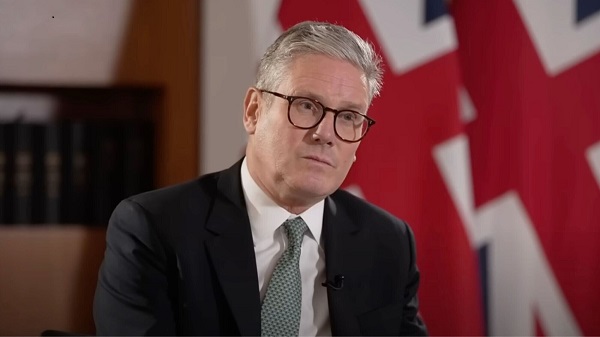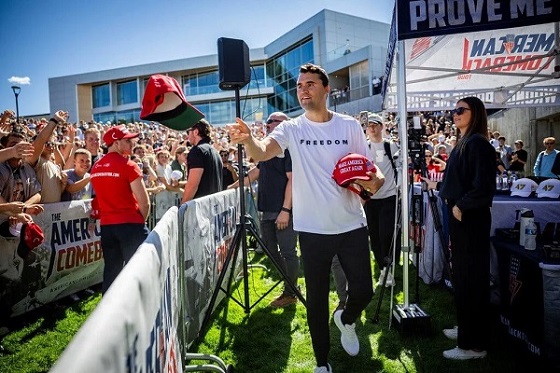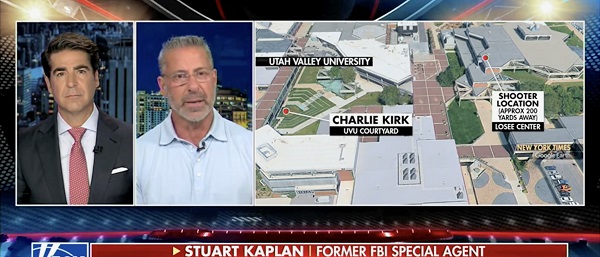Uncategorized
Caravan migrants break Guatemala border fence, rush Mexico

TECUN UMAN, Guatemala — Central Americans
Arriving on the Mexican side of a border bridge, they were met by a phalanx of police with riot shields. About 50 managed to push their way through before officers unleashed pepper spray and the rest retreated.
The gates were closed again, and a federal police officer used a loudspeaker to address the masses, saying, “We need you to stop the aggression.”
Waving Honduran flags and carrying umbrellas to protect against the sun, the migrants arrived earlier at the Guatemalan side of the muddy Suchiate River that divides the country from Mexico, noisily demanding they be let in.
“One way or another, we will pass,” they changed, clambering atop to U.S.-donated military jeeps parked at the scene as Guatemalan police looked on.
Young men began tugging on the fencing and finally succeeded in tearing it down, and men, women and children rushed through and toward the border bridge just up the road.
Edwin Santos of San Pedro Sula was one of the first to race past helpless Guatemalan police, clutching the hands of his father and wife.
“We are going to the United States!” he shouted euphorically. “Nobody is going to stop us!”
Earlier Friday, Mexico’s ambassador to Guatemala said his country intended to enforce what he called a policy of orderly entry in the face of the thousands trying to cross.
Ambassador Luis Manuel Lopez Moreno added that more than 100 migrants had been allowed to cross the bridge to apply for refugee status, including some who were from the caravan and others who were not.
Meanwhile, the rafts that normally ferry throngs of people across the river were carrying mostly merchandise and the raft operators said they had been warned by Mexican authorities not to carry people.
Jose Porfirio Orellana, a 47-year-old acorn and bean farmer from Yoro province in Honduras, said he hopes to reach the United States due to woeful economic conditions in his country.
“There is nothing there,” Orellana said.
The first members of the 3,000-strong caravan began arriving in the Guatemalan border town of Tecun Uman on buses and trucks early Thursday, but the bulk of the group sloshed into town on foot in a downpour late in the afternoon and into the evening.
As the sun rose, a military helicopter flew along the Mexican side of the river foreshadowing the difficulties they could face. At the same time, several busloads of Mexican federal police in riot gear deployed at the border crossing in Ciudad Hidalgo.
Jonathan Guzman, who joined the mass procession caravan en route, said he dreams of finding a construction job in Los Angeles. “It’s the third time that I’m trying to cross,” the 22-year-old Salvadoran said.
Mexican Foreign Relations Secretary Luis Videgaray said those with passports and valid visas would be let in immediately, though he acknowledged that “we anticipate those are the minority.”
Those who want to apply for refuge in Mexico will be welcome to do so “if they have a vulnerable situation in their country of origin,” Videgaray said in an interview with the Televisa network.
Any who decide to cross illegally and are caught will be detained and deported, the Mexican government has said.
Trump has made it clear to Mexico that he is monitoring its response. Early Thursday, he threatened to close the U.S. border if Mexico let the migrants advance. Later, he retweeted a video of Mexican federal police arriving at the Guatemalan border and wrote: “Thank you Mexico, we look forward to working with you!”
In April, Mexican immigration officials had some success in dispersing a smaller caravan by processing many who decided to seek refugee status in Mexico, but some did continue on to the U.S. border.
Asked in the Televisa interview whether Mexico was doing Trump’s “dirty work,” Videgaray said Mexico “defines its migration policy in a sovereign manner” and the country’s priority is to protect the migrants and ensure their human rights.
He did not seem concerned about Trump’s threat to close the U.S.-Mexico border, saying the threat should be viewed in light of the hotly contested midterm elections in the United States, in which Trump has made border security a major campaign issue.
The foreign secretary noted that 1 million people transit the border legally every day, and about $1 million in commerce crosses every minute.
“Before taking decisions of that kind,” Videgaray said, “there would be many people in the United States … who would consider the consequences.”
Sonia Perez D. And Mark Stevenson, The Associated Press
Uncategorized
CNN’s Shock Climate Polling Data Reinforces Trump’s Energy Agenda


From the Daily Caller News Foundation
As the Trump administration and Republican-controlled Congress move aggressively to roll back the climate alarm-driven energy policies of the Biden presidency, proponents of climate change theory have ramped up their scare tactics in hopes of shifting public opinion in their favor.
But CNN’s energetic polling analyst, the irrepressible Harry Enten, says those tactics aren’t working. Indeed, Enten points out the climate alarm messaging which has permeated every nook and cranny of American society for at least 25 years now has failed to move the public opinion needle even a smidgen since 2000.
Appearing on the cable channel’s “CNN News Central” program with host John Berman Thursday, Enten cited polling data showing that just 40% of U.S. citizens are “afraid” of climate change. That is the same percentage who gave a similar answer in 2000.
Dear Readers:
As a nonprofit, we are dependent on the generosity of our readers.
Please consider making a small donation of any amount here.
Thank you!
Enten’s own report is an example of this fealty. Saying the findings “kind of boggles the mind,” Enten emphasized the fact that, despite all the media hysteria that takes place in the wake of any weather disaster or wildfire, an even lower percentage of Americans are concerned such events might impact them personally.
“In 2006, it was 38%,” Enten says of the percentage who are even “sometimes worried” about being hit by a natural disaster, and adds, “Look at where we are now in 2025. It’s 32%, 38% to 32%. The number’s actually gone down.”
In terms of all adults who worry that a major disaster might hit their own hometown, Enten notes that just 17% admit to such a concern. Even among Democrats, whose party has been the major proponent of climate alarm theory in the U.S., the percentage is a paltry 27%.
While Enten and Berman both appear to be shocked by these findings, they really aren’t surprising. Enten himself notes that climate concerns have never been a driving issue in electoral politics in his conclusion, when Berman points out, “People might think it’s an issue, but clearly not a driving issue when people go to the polls.”
“That’s exactly right,” Enten says, adding, “They may worry about in the abstract, but when it comes to their own lives, they don’t worry.”
This reality of public opinion is a major reason why President Donald Trump and his key cabinet officials have felt free to mount their aggressive push to end any remaining notion that a government-subsidized ‘energy transition’ from oil, gas, and coal to renewables and electric vehicles is happening in the U.S. It is also a big reason why congressional Republicans included language in the One Big Beautiful Bill Act to phase out subsidies for those alternative energy technologies.
It is key to understand that the administration’s reprioritization of energy and climate policies goes well beyond just rolling back the Biden policies. EPA Administrator Lee Zeldin is working on plans to revoke the 2010 endangerment finding related to greenhouse gases which served as the foundation for most of the Obama climate agenda as well.
If that plan can survive the inevitable court challenges, then Trump’s ambitions will only accelerate. Last year’s elimination of the Chevron Deference by the Supreme Court increases the chances of that happening. Ultimately, by the end of 2028, it will be almost as if the Obama and Biden presidencies never happened.
The reality here is that, with such a low percentage of voters expressing concerns about any of this, Trump and congressional Republicans will pay little or no political price for moving in this direction. Thus, unless the polls change radically, the policy direction will remain the same.
David Blackmon is an energy writer and consultant based in Texas. He spent 40 years in the oil and gas business, where he specialized in public policy and communications.
Uncategorized
Kananaskis G7 meeting the right setting for U.S. and Canada to reassert energy ties


Energy security, resilience and affordability have long been protected by a continentally integrated energy sector.
The G7 summit in Kananaskis, Alberta, offers a key platform to reassert how North American energy cooperation has made the U.S. and Canada stronger, according to a joint statement from The Heritage Foundation, the foremost American conservative think tank, and MEI, a pan-Canadian research and educational policy organization.
“Energy cooperation between Canada, Mexico and the United States is vital for the Western World’s energy security,” says Diana Furchtgott-Roth, director of the Center for Energy, Climate and Environment and the Herbert and Joyce Morgan Fellow at the Heritage Foundation, and one of America’s most prominent energy experts. “Both President Trump and Prime Minister Carney share energy as a key priority for their respective administrations.
She added, “The G7 should embrace energy abundance by cooperating and committing to a rapid expansion of energy infrastructure. Members should commit to streamlined permitting, including a one-stop shop permitting and environmental review process, to unleash the capital investment necessary to make energy abundance a reality.”
North America’s energy industry is continentally integrated, benefitting from a blend of U.S. light crude oil and Mexican and Canadian heavy crude oil that keeps the continent’s refineries running smoothly.
Each day, Canada exports 2.8 million barrels of oil to the United States.
These get refined into gasoline, diesel and other higher value-added products that furnish the U.S. market with reliable and affordable energy, as well as exported to other countries, including some 780,000 barrels per day of finished products that get exported to Canada and 1.08 million barrels per day to Mexico.
A similar situation occurs with natural gas, where Canada ships 8.7 billion cubic feet of natural gas per day to the United States through a continental network of pipelines.
This gets consumed by U.S. households, as well as transformed into liquefied natural gas products, of which the United States exports 11.5 billion cubic feet per day, mostly from ports in Louisiana, Texas and Maryland.
“The abundance and complementarity of Canada and the United States’ energy resources have made both nations more prosperous and more secure in their supply,” says Daniel Dufort, president and CEO of the MEI. “Both countries stand to reduce dependence on Chinese and Russian energy by expanding their pipeline networks – the United States to the East and Canada to the West – to supply their European and Asian allies in an increasingly turbulent world.”
Under this scenario, Europe would buy more high-value light oil from the U.S., whose domestic needs would be back-stopped by lower-priced heavy oil imports from Canada, whereas Asia would consume more LNG from Canada, diminishing China and Russia’s economic and strategic leverage over it.
* * *
The MEI is an independent public policy think tank with offices in Montreal, Ottawa, and Calgary. Through its publications, media appearances, and advisory services to policymakers, the MEI stimulates public policy debate and reforms based on sound economics and entrepreneurship.
As the nation’s largest, most broadly supported conservative research and educational institution, The Heritage Foundation has been leading the American conservative movement since our founding in 1973. The Heritage Foundation reaches more than 10 million members, advocates, and concerned Americans every day with information on critical issues facing America.
-

 Frontier Centre for Public Policy13 hours ago
Frontier Centre for Public Policy13 hours agoBloodvein Blockade Puts Public Land Rights At Risk
-

 Business1 day ago
Business1 day agoDeportations causing delays in US construction industry
-

 Health2 days ago
Health2 days agoMAiD should not be a response to depression
-

 Alberta18 hours ago
Alberta18 hours agoParents group blasts Alberta government for weakening sexually explicit school book ban
-

 Crime1 day ago
Crime1 day agoCanadian teacher showed Charlie Kirk assassination video to young students, said he deserved to die
-

 Business2 days ago
Business2 days agoRed tape is killing Canadian housing affordability
-

 International2 days ago
International2 days agoTrump to Confront Starmer Over UK Free Speech Laws During State Visit
-

 Business14 hours ago
Business14 hours agoThe Truth Is Buried Under Sechelt’s Unproven Graves






